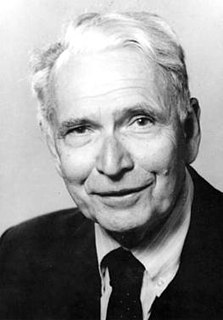A Quote by Robert A. Heinlein
Why don't they make more science fiction movies? The answer to any question starting, Why don't they- is almost always, Money.
Related Quotes
Science tries to answer the question: "How?" How do cells act in the body? How do you design an airplane that will fly faster thansound? How is a molecule of insulin constructed? Religion, by contrast, tries to answer the question: "Why?" Why was man created? Why ought I to tell the truth? Why must there be sorrow or pain or death? Science attempts to analyze how things and people and animals behave; it has no concern whether this behavior is good or bad, is purposeful or not. But religion is precisely the quest for such answers: whether an act is right or wrong, good or bad, and why.
If you have a little inteligence, sooner or later the question is bound to arise: What is the point of it all? Why? It is impossible to avoid the question for long. And if you are very intelligent, it is always there, persistently there, hammering on your heart for the answer: Give me the answer! - Why?
The great thing about fiction is that I don't have to settle on an answer to any troubling question, or even a solution. I hope that my stories serve as explorations and help show readers how and why real-life women don't always make the "correct" decisions in the face of economic and sexual troubles. We all screw up, but the women I write about don't have back-up plans or money in the back or resources to fix what they have broken.
When I decided to write about my brother and friends, I was attempting to answer the question why. Why did they all die like that? Why so many of them? Why so close together? Why were they all so young? Why, especially, in the kinds of places where we are from? Why would they all die back to back to back to back? I feel like I was writing my way towards an answer in the memoir.
This crazy little party girl who loves to enjoy life actually has a purpose. So, that's really the core of why I've survived so many years and I can go and I can fall down and I can get back up. Why? Because I know why I'm here. That's the question that a lot of people need to answer when they do fall is, 'Why am I here?' If you can answer that question, you'll be able to dust yourself off and shine like a phoenix out of ashes.
I can think of very few science books I've read that I've called useful. What they've been is wonderful. They've actually made me feel that the world around me is a much fuller, much more wonderful, much more awesome place than I ever realized it was. That has been, for me, the wonder of science. That's why science fiction retains its compelling fascination for people. That's why the move of science fiction into biology is so intriguing. I think that science has got a wonderful story to tell.
Whence came I, whither go I? Science cannot tell us a word about why music delights us, of why and how an old song can move us to tears. Science is reticent too when it is a question of the great Unity – the One of Parmenides – of which we all somehow form part, to which we belong. The most popular name for it in our time is God – with a capital ‘G’. Whence come I and whither go I? That is the great unfathomable question, the same for every one of us. Science has no answer to it.






































